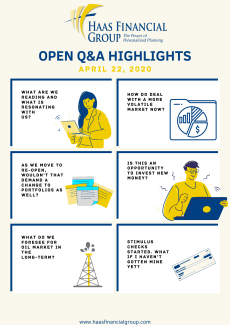Open Q&A Highlights - April 22
Listen to the full discussion here
Don't have time for the full 40 minutes? Transcript highlights are listed below or click here:
Intro: 0:00 – 4:30
Topics Included:
- There’s a lot of reporting and opinions on what a recovery could look like. What are we reading and what is resonating with us? (4:30)
- Not a “V” shape. Going to go back and forth between focus on healthcare (shelter in place at expense of economy) and focus on economics (at the expense of healthcare)
- Median projections calling for 3000 on S&P 500 by year-end but with volatility
- We feel there is a floor to the market based on fiscal stimulus and policy response
- “New” market is more like my 12-year old than the old wise man – unstable and unpredictable. Need to set that new expectation.
- To the conservative investor, how do deal with a more volatile market now? (10:15)
- Fear and uncertainty is understandable – we feel it too.
- No silver bullet to investing. Default to the fundamentals of portfolio construction; diversification of assets and diversification of time.
- Point of diversification and asset allocation in financial planning is to weather storms and trust long-term growth
- Deal with it by putting yourself in a position to rebalance portfolios
- Keep a steady hand through all the information and don’t feel like you have to make changes
- Your advice is to stay the course. But what about the fact that certain companies will not survive, and certain industries may flourish? The economy is changing. As we move to re-open, wouldn’t that demand a change to portfolios as well? (15:45)
- I think the key is to not change the framework of an allocation, your risk tolerance and balance.
- Getting more into the weeds, yes, the underlying holdings should absolutely be reviewed, but that’s what the fund managers are paid to do.
- But step one has to be the financial plan and reviewing the purpose of the allocation. Does a new environment mean I have to change my risk tolerance and portfolio objectives? For most people the answer to that is no.
- While covid-19 is a new, unprecedented event, recessions are not. Cycles occur and voids are filled just like technology changed business after the last recession.
- How will it change is a good question. Will it be stateside supply chain? Energy independence? More localized healthcare? Regardless, I believe that 3, 5, 10 years from now we will be in a better spot.
- Is this an opportunity to invest new money (21:30)
- If you have new money to invest, we do feel better today than two months ago. Most equities are cheaper. We also feel better about policy and fiscal stimulus.
- But we feel the responsible thing is not to try to time things. Divide your investment into pieces and dollar-cost average.
- What do we foresee for oil market in the long-term (24:20)
- Not our areas of expertise but hit a lot of headlines so we will give some context for what those headlines meant “oil going negative.”
- Newsworthy a few weeks ago when we knew supply would far outweigh the demand.
- The “negative” is more a function of trading future contracts (i.e. oil is not “free”) but it does tell us a little something about expectations for consumption to pick back up.
- Long-term, sure, price will go up. But one would have to consider the short-term potential for opportunity loss and, personally, we don’t make bets like this. Let the fund managers figure out what to be buying.
- We have to be optimistic of normalization. We need to get people back to work. But over what period of time? (29:55)
- What weighs on my mind is setting the expectation that this isn’t going to be smooth. Headlines will give us pause, cases will likely pick back up, and things will be slow.
- But we need to keep the context that the market tries to be very forward looking. It’s not making a bet on the next six weeks, rather its months and years.
- First message, if you had a plan that was working coming into this, don’t feel that you NEED to do or change something.
- Second message, we have to maintain a degree of optimism. I say that not to sound naïve, we do plenty of research to go along with that. But diversification is about not having to feel like you made a perfect decision, every time. Long-term, investing works, even when we go through these difficult times.
- Stimulus checks started. What if I haven’t gotten mine yet? And is this a forward of next year’s refund? (34:05)
- IRS is understaffed, working remotely and with old technology. To throw the stimulus on top of their regular workload is a tall task. Checks (mailed) will come but requires patience.
- “Get My Payment” is a resource for you on IRS website, with opportunity to provide IRS with direct deposit information.
- Stimulus is a tax credit, not an advance of your refund. This is a dollar for dollar reduction of liability (treat it like a gift card!).
- End (40:00)
The opinions voiced in this material are for general information only and are not intended to provide specific advice or recommendations for any individual.
All investing involves risk including loss of principal. No strategy assures success or protects against loss. There is no guarantee that a diversified portfolio will enhance overall returns or outperform a non-diversified portfolio. Diversification does not protect against market risk.
The economic forecasts set forth in this material may not develop as predicted and there can be no guarantee that strategies promoted will be successful.
Tracking # 1-05006067


